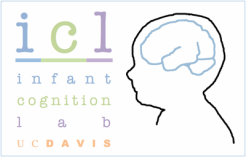Working in the Infant Cognition Lab
The role of Undergraduates in our research
Undergraduates have a very important role in our research. Teams of undergraduate students, graduate students, staff, and Dr. Oakes conduct the work relating to our research. Undergraduate research assistants participate in all aspects of our research - they help recruit infant participants, provide information for parents who are interested in participating, set up and run the experiments, code infant behavior, and enter data from various studies. In short, we rely on undergraduate research assistants to test babies in experiments. Also, you earn course credit (PSC 99/199) or transcript notation for working in the lab!
The duties of Undergraduate Research Assistants
One of the main duties of an undergraduate research assistant is to test infant subjects in experiments. Often this means setting up a computer, explaining a study to a parent, obtaining informed consent, and making the baby and parent feel comfortable in the lab setting. For other studies, the undergraduate student plays and interacts with the baby in a specified manner.
In addition to testing infants, research assistants are involved in coding infant behavior (e.g., whether the infant was looking to the left or right of a screen, or how a baby interacts with a toy), recruiting and scheduling participants, entering data, creating content for our lab social media pages, and more.
The research assistants in our lab learn skills for managing, cleaning, and analyzing data. We regularly teach our research assistants how to code in R and there are often opportunities to develop other skills.
Once undergraduate research assistants have spent about a year (or more) in the lab, they are expected to get involved in a project to present at the Undergraduate Research Conference held by UC Davis every spring.
What an Undergraduate can learn from this experience
Our undergraduate research assistants get "hands on" research experience, and see developmental research in action. Working in the lab provides students with a chance to learn about how studies are designed, planned, and run. In addition, by observing and participating in discussions with faculty and graduate students, undergraduate students learn how we analyze and interpret results, and how findings lead to new hypotheses. Students may also be able to conduct their own independent project, once they have gained sufficient experience in the lab.
Working in this context is excellent preparation for any student planning on graduate work in Psychology and other fields. Students gain valuable experience working as part of a team, as well as insight into the process of research and the life of a graduate student.
Requirements
Students are required to make a two-quarter commitment, though often students enroll for more than two quarters. The lab is open year-round, so students can be involved during the summer sessions. Each quarter a student is involved in the lab, they enroll in PSC 099/199 for 3 credits or choose transcript notation. This translates to 9 hours each week in the lab (between 9-5 Monday through Friday) plus a mandatory 1 hour lab meeting. During this lab meeting we discuss on-going projects, assign new projects, discuss research articles, learn R, and have presentations of results from graduate students or Dr. Oakes. We also sometimes test infants on Saturdays, so students may be asked to help run appointments on a Saturday during their time in the lab.
Coursework in cognitive psychology, developmental psychology, or human development is preferred. Students should have good interpersonal skills and be comfortable around children (experience with young children is a plus).

